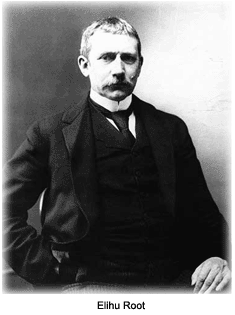Elihu Root was born in Clinton, New York and in 1864 graduated from Hamilton College, where his father was a professor of mathematics. Following a year of teaching, Root enrolled in the law school at New York University. He received his degree and was admitted to the New York bar in 1867. He established a practice in New York City and concentrated on corporate law. His advocacy of the interests of various railroads and financial institutions made him a wealthy man by the age of 30. During these early years, Root did not run for public office, but became active in local Republican politics. In 1873, he defended "Boss" Tweed in a celebrated trial, an action that haunted him for years.
 In 1883, Elihu Root was appointed U.S. District Attorney for the Southern District of New York, a position that allowed him to become acquainted with Theodore Roosevelt. Root resumed his private practice in 1885.
In 1883, Elihu Root was appointed U.S. District Attorney for the Southern District of New York, a position that allowed him to become acquainted with Theodore Roosevelt. Root resumed his private practice in 1885.
In 1899, William McKinley demonstrated great wisdom by selecting Elihu Root, a respected lawyer, to be his secretary of war. Continuing to serve under Roosevelt, Root sponsored a thorough revamping of the post-Spanish-American War military. He created a general staff, reorganized the army, expanded West Point, founded the Army War College and strengthened controls over the National Guard. Root also was the driving force behind the Platt Amendment and the Foraker Act, and served on the Alaskan Boundary Tribunal.
Elihu Root retired briefly in 1904, but answered the call to become Roosevelt’s secretary of state the following year. His accomplishments included bringing many State Department employees under civil service protection, improving U.S. ties to Latin American governments in the wake of the events in Panama and concluding the Root-Takahira Agreement with Japan. He also helped to settle a fisheries dispute with Britain in the North Atlantic and negotiated a variety of arbitration treaties.
In 1909, Elihu Root began a single term as a U.S. senator from New York. During this time, he supported William Howard Taft for the nomination in 1912, served as a member of the Hague Tribunal and was awarded the Nobel Peace Prize for his many efforts on behalf of international understanding. Root declined reelection to the Senate in 1914.
Elihu Root remained extremely active as an elder statesman. He was critical of Woodrow Wilson’s [neutrality] policies, but later supported the president during American participation in World War I. In 1917, he headed a diplomatic mission to Russia and later worked on behalf of the League of Nations and the World Court. Root was a delegate to the Washington Naval Conference in 1921-22.
In his final years, Root worked with ^Andrew Carnegie^ on a variety of international peace projects.
While not well known to the casual student, Elihu Root was one of America’s most distinguished public servants. He was dedicated to advancing the use of arbitration as a means of enhancing peace prospects worldwide. He was not a starry-eyed idealist, but instead brought his talents as a tough-minded attorney to his task.